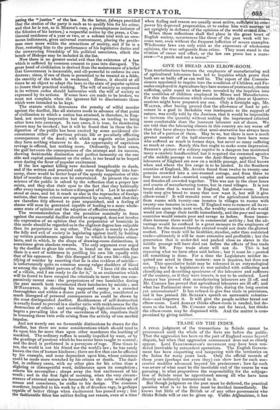GIVE US BREAD AND ELBOW-ROOM.
THE recriminations between the employers of manufacturing and of agricultural labourers have led to inquiries which prove that both are as badly off as can well be. The report of the Commissioners appointed to inquire into the condition of Children and Females employed in Agriculture lays bare scenes of protracted, chronic suffering, quite equal to what were revealed by the inquiries into the condition of children employed in Mines and Manufactures. For this the discussions which occasionally take place at Quartersessions might have prepared any one. Only a fortnight ago, Mr. WALTER, after having proved that the allowance of food to prisoners in a gaol in Berkshire was inadequate to the support of nature, was coolly told by the Justices, that it would be impossible to increase the quantity without making the imprisoned criminal more comfortable than the innocent labourer out of doors. We are told that the labouring classes in this country are not worse off than they have always been—that semi-starvation has always been the lot of a portion of them. May be so, but there is now a much greater number of the half-starved : there may have been some who suffered as much in former days, but never so many suffering so much at once. Surely this fact ought to make some impression. STERNE'S picture of a solitary captive in a dungeon has moistened many a cambric handkerchief, but it required the crammed agonies of the middle passage to rouse the Anti-Slavery agitation. The labourers of England are now on a middle passage, and God knows when and where the live cargo is to be landed. In the Southern counties of England, Mr. AUSTIN found from twelve to twenty-one persons crowded into a one-roomed cottage, and from three to four into every bed—married couples and unmarried adult males and females all crowded together. This was not in the close lanes and courts of manufacturing towns, but in rural villages. It is not bread alone that is wanted in England, but elbow-room. Free trade may give bread to many that now want it, but will it give elbow-room ? It will transfer some of the agricultural labourers from rooms with twenty-one inmates in villages to rooms with twenty-one inmates in towns. If England were to remove all its restrictions upon trade next week, the wealthy countries of the world would not change their tariffs immediately, and the poor and savage countries would remain poor and savage as before. Some immediate increase there would be in commercial activity ; but the advantage would be confined in a great measure to the employers of labour, for the demand thereby created would not drain the glutted market. Free trade will be healthier, steadier, safer than restricted trade—ultimately it will be more extensive and profitable ; but thegeneration that is under-fed and packed close as slaves in the middle passage will have died out before the effects of free trade
can be felt. Free trade alone will not do. This is but repeating what we have often said before ; but it must be repeated till something is done. For a time the Legislature neither inquired nor acted in these matters : now it inquires, but does not act. This speculative habit may be tolerated in an entymological society ; but for a legislature to rest satisfied with collecting and classifying and describing specimens of the labourers and sufferers of the country, as if they were insects, is not to be endured. Lord ASHLEY has proved that manufacturing labourers are ill off, and Mr. COBDEN has proved that agricultural labourers are ill off; and what has Parliament done to remedy this, during the long session yet unterrninated ? It has refused to give free trade in provisions, and it has praised Mr. BULLER'S speech on systematic colonization—and forgotten it. It will give the people neither bread nor elbow-room. Lord ASHLEY thinks elbow-room is needed, but demurs to the bread. Mr. COBDEN cries out for bread, but thinks the elbow-room may be dispensed with. And the matter is coin. promised by giving neither.


























 Previous page
Previous page